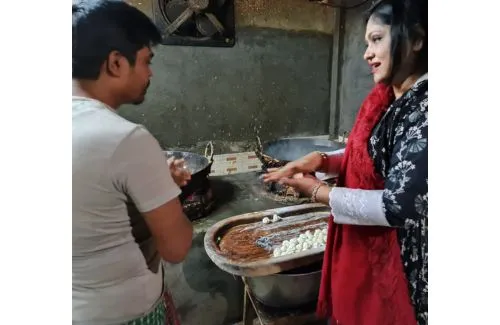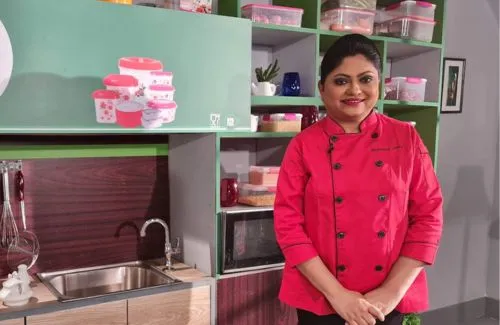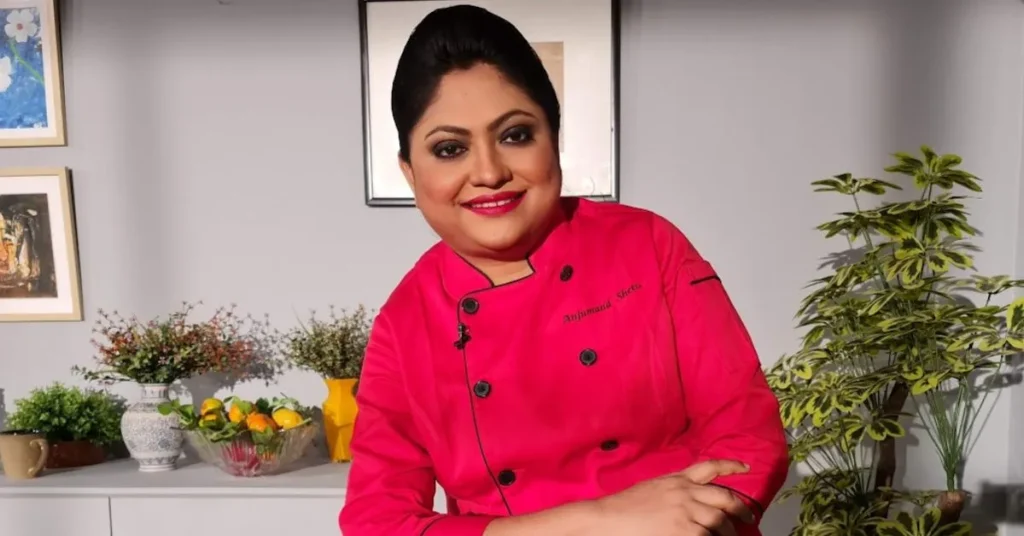Discover the inspiring culinary journey of Anjumand Sethu ignited by familial influence. Guided by familial support and a love for good food, Anjumand Sethu, is a testament to the power of resilience and heritage in shaping culinary passion.
Ria: Could you share with us the story of how your journey in the cooking industry began?
AS: My culinary journey is deeply rooted in family history, particularly through my grandmother’s influence. Despite losing a leg during the 1971 war, she continued to cook traditional dishes with immense love and dedication. I vividly remember how she poured her heart and soul into preparing traditional dishes, like pithes, even sacrificing sleep to ensure our enjoyment the next morning. Witnessing her dedication and the joy it brought to others left an indelible mark on me, shaping my own passion for cooking. My father also played a significant role in nurturing my skills, guiding me in the kitchen and instilling a deep appreciation for cooking. Even after marriage, my husband and in-laws, who share a love for good food, further inspired my culinary endeavors.

Ria: Could you elaborate on how your passion for cooking transitioned into your profession?
AS: Initially, I pursued my academic interests, completing my post-graduation in Geography and later exploring interior designing. However, due to my husband’s job in the army, relocating frequently posed challenges for a conventional career. Despite this, my passion for cooking persisted. I began teaching recipes at the army cantonment’s ladies club, sparking my interest in culinary arts. Participating in competitions and cookery shows garnered recognition for my skills, leading to publications and establishing credibility. To formalize my culinary education, I enrolled in chef courses in Bangladesh.
With a solid foundation in place, I took a bold step forward and ventured into entrepreneurship by opening my own restaurant, ‘Setu’s Kitchen’. Additionally, I expanded my services to include catering and professional cooking classes, imparting my expertise to aspiring cooks.
Ria: What is your perspective on the difference between professionally trained chefs and home chefs?
AS: The gap between trained chefs and home cooks stems from formal education and technical expertise. Those who undergo institutional training in culinary arts benefit from structured guidance provided by industry experts like technique, measurements, seasoning, and hygiene. Conversely, home cooks rely on personal passion and experimentation, lacking formal training. Transitioning to professional roles without education is challenging. While home cooks excel in catering, career options in established establishments are limited. Nonetheless, dedication and continuous learning can bridge the gap, elevating home cooks’ skills toward professional expertise. With commitment, they can overcome barriers and contribute to the culinary industry’s diversity and innovation.
Also Read: Empowering Wellness: Rashmi Biyani’s Inspiring Journey and Vision
Ria: In your opinion, what makes cooking a beneficial profession for women?
AS: Cooking holds immense potential as a beneficial profession for women for several reasons. Firstly, cooking is a skill that many women naturally possess, often cultivated through years of preparing meals for their families. By honing basic culinary skills and exploring street foods and snacks, women can embark on entrepreneurial ventures with minimal investment. Initiatives such as selling homemade pickles, ghee, traditional pithes, and other culinary delights offer a lucrative avenue for generating income from the comfort of their homes.
Moreover, cooking provides women with a means to carve out their own identity and financial independence.
Ria: What are your thoughts on the trend of fusion food versus authentic cuisine?
AS: Authentic cuisine serves as the cornerstone of our culinary heritage, embodying the essence of our cultural roots. It’s imperative not to overlook the significance of authentic dishes, as they offer a genuine taste of tradition and history.
While fusion food allows for creativity and innovation, it’s vital to maintain a balance between tradition and experimentation. Fusion cuisine should enhance, not overshadow, the authenticity of dishes. For instance, I support fusion variations that respect traditional integrity while adding contemporary elements. For example, I introduce twists like chocolate patishapta to appeal to modern palates while preserving the essence of the original dish. However, caution is necessary to prevent diluting the dish’s identity. Introducing elements too far from the tradition can disrupt the balance of flavors and textures. It’s essential to approach fusion cuisine with respect for culinary heritage, ensuring that innovative twists enhance rather than overshadow the authenticity of traditional dishes.

Ria: In your journey as a woman in the cooking profession and business owner, what challenges did you encounter?
AS: As a woman venturing into the cooking profession and subsequently running a successful business, I faced several challenges along the way. One significant hurdle was the initial reluctance and resistance from my predominantly male staff. Their hesitation to accept me as their boss stemmed from traditional gender biases. However, through consistent support, encouragement, and demonstrating my dedication to their growth and success, I gradually earned their respect and trust.
Moreover, societal perceptions added another layer of difficulty. Many customers and individuals held the stereotype that restaurant businesses were better suited for men, leading to skepticism and diminished appreciation for a woman in a leadership role. Overcoming these preconceptions required not only proving my competency but also challenging outdated gender norms within the industry.
Ria: Tell us about your upcoming projects.
AS: I am dedicated to promoting the traditional delicacy of pithe and making it accessible to people of all ages across Bangladesh throughout the year. In line with the cultural custom of exchanging sweets when visiting someone, I aim to encourage people to include pithes in this tradition. My goal is to preserve and promote the age-old tradition of making and enjoying pithes so that even today’s generation can appreciate and savor these authentic delicacies. By increasing awareness and accessibility to pithe, I hope to ensure that this cherished part of our culinary heritage remains alive and celebrated in our society.
Ria: Tips you want to give to people who want to start their business on cooking.
AS: If an individual wishes to start a business in the food industry, they must prioritize genuineness both in their character and in the dishes they serve. It is essential to use appropriate ingredients and quantities while maintaining proper hygiene standards. Additionally, the new business should strive to keep prices affordable to ensure that everyone has the opportunity to enjoy the food offered.
Ria: Let us get into rapid fire.
- What three foods are favourite for Anjumand Sethu?
AS: Umm! Three…if told will be –
- Achaari mangsho
- Mishti kumror mithuri
- Kalo Bhuna
2. 3 foods from Kolkata that Anjumand Sethu miss in Bangladesh?
AS: This is very simple (she says as she smiles) –
- Chingri diye Kochu Saag
- Fish Kobiraji
- Gulab Jamun




